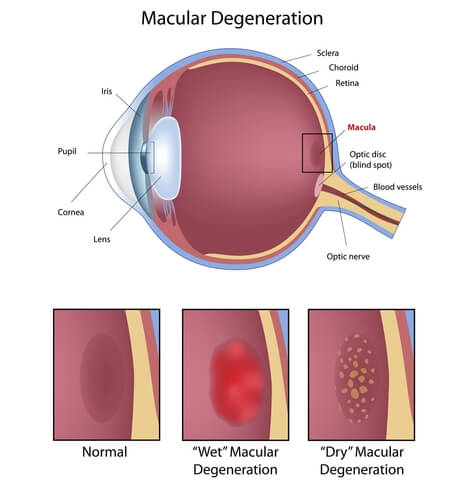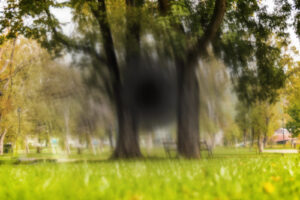As we age, our bodies undergo numerous changes, and our vision is no exception. Among the various eye conditions that can develop later in life, age-related macular degeneration (AMD) stands out as one of the more common concerns for older adults.
Keep reading to understand your risk for age-related macular degeneration better, what it is, and how it can affect your vision.
What is Macular Degeneration?

To understand macular degeneration, it helps to know a bit about eye anatomy. The macula sits at the center of the retina, which is a thin membrane lining the back of your eye. This area contains specialized photoreceptor cells that capture light and convert it into signals sent to your brain for processing.
Macular degeneration happens when these crucial photoreceptor cells in the macula become damaged and eventually die. Since the macula is responsible for your central vision, damage to this area directly impacts your ability to see clearly straight ahead.
In most cases, this condition develops due to the natural aging process. As we get older, the arteries that supply blood and oxygen to the macula can harden, reducing the vital nutrients this tissue needs to stay healthy. Without adequate oxygen, the macula begins to deteriorate and thin out. In severe cases, people may lose their central vision completely.
Two Types of AMD
Age-related macular degeneration comes in two forms: dry and wet.
Dry AMD accounts for the majority of cases. This type develops when yellowish deposits called drusen accumulate beneath the macula. These deposits form as a result of hardened arteries and gradually cause the macula to thin and weaken. Dry AMD typically progresses slowly, and people may experience few or no symptoms in the early stages.
Wet AMD affects only about 10% of people with macular degeneration but tends to be more aggressive. This form occurs when blood vessels beneath the macula begin growing abnormally, becoming swollen and leaky. The resulting blood and fluid cause scarring that destroys photoreceptor cells. Wet AMD generally progresses much faster than the dry form.
Recognizing the Signs

Age-related macular degeneration can be particularly challenging because early symptoms are often subtle or absent entirely. As the condition advances, you might notice that your central vision becomes increasingly blurry, or you may begin to see dark or blank spots in your field of vision.
One of the earliest warning signs is when straight lines begin to appear wavy or distorted. This symptom deserves immediate attention from an eye care professional.
Because symptoms can be so mild initially, regular comprehensive eye exams become crucial for early detection. These examinations can identify changes in your retina before they significantly impact your daily life.
Understanding Your Risk
Several factors can increase your likelihood of developing AMD. Age is the primary risk factor, with the condition being most common in people over 50. Women appear to be at slightly higher risk than men.

Lifestyle factors also play a role. Smoking significantly increases your risk, as does following a diet high in saturated fats. Having high blood pressure or cardiovascular disease can also contribute to AMD development.
Environmental factors matter too. Extended exposure to ultraviolet light without proper eye protection may increase your risk. Interestingly, people with lighter-colored irises and those who are farsighted may also be more susceptible.
Genetics can’t be overlooked either. If AMD runs in your family, you may be at higher risk of developing the condition yourself.
Taking Control Where You Can
While you can’t change factors like your age, gender, or family history, you do have control over certain lifestyle choices. Not smoking is one of the most important steps you can take to reduce your risk. Maintaining a balanced diet rich in leafy greens and fish, staying physically active, and protecting your eyes from UV exposure with quality sunglasses can all help support your eye health.
The Importance of Regular Eye Care
Given that early AMD often presents no symptoms, regular eye examinations become your best defense. Most experts recommend that people over 50 have comprehensive eye exams annually, though your individual risk factors may warrant more frequent visits.
During these exams, your eye care provider can detect early changes in your retina and help you understand your personal risk level. They can also provide guidance on how often you should schedule follow-up appointments based on your specific situation.
Understanding age-related macular degeneration empowers you to make informed decisions about your eye health. While the condition can be serious, early detection and appropriate management can help preserve your vision and maintain your quality of life as you age.
To learn more about age-related macular degeneration and your risk, make an appointment at St. Luke’s Cataract & Laser Institute to consult with one of our retina care specialists.








